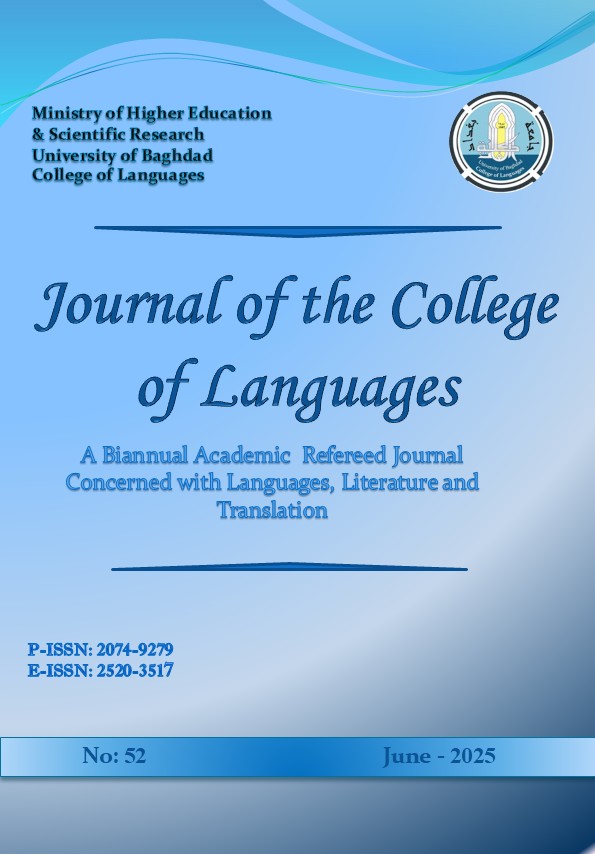Forms of Resistance in Dunya Mikhail's Poetry: A Feminist Study
DOI:
https://doi.org/10.36586/jcl.2.2025.0.52.0045Keywords:
Dunya Mikhail, , Feminism, Feminist Theory, Poetry, Resistance, War PoetryAbstract
This research explores the various forms of resistance embedded in Dunya Mikhail's poetry through a feminist lens, focusing on her articulation of women's struggles against socio-political injustices. Analyzing Mikhail's poetry alongside critical feminist theory, the study reveals that her work employs nuanced imagery and subversive language to challenge oppressive structures, emphasizing themes of female agency, identity, and resilience. Key findings indicate that Mikhail's poetry not only critiques the socio-political landscape but also advocates for empowerment and social change, making a vital connection between personal narratives and broader feminist movements. The significance of these insights extends beyond literary analysis, highlighting the importance of creative expression in addressing issues of physical health and emotional well-being, particularly for marginalized voices affected by systemic oppression. Accordingly, this paper offers a new reading of Dunya Mikhail’s poetry in the light of Judith Butler’s theory of gender performativity, suggesting that the former’s female characters challenge societal and cultural limitations to engage in a fluid, performative gender identity that redefines the parameters of feminist representations. Through a reconstructed sense of self, their flaws serve as a catalyst to redefine gender identity, not as a static defect or source of despair, but as an exploratory realm from which new expressions of the self or identity can arise. This paper examines how Mikhail's poetic portrayal of women embodies feminist resistance via symbolic defiance, fluidity, and nonconformity. By placing Mikhail’s work in the context of feminist theory and post-war sociopolitical dynamics in Iraq, the paper uncovers how gender identity acts as a point of resistance and how poetic language functions as a transformative medium for self-expression.
References
Abdulatif, I. A. (2017). Numbness of the mind paradigm in Haruki Murakami’s After the Quake and Iraq’s after the quake. Journal of the College of Languages (JCL), 35, 14-38. https://jcolang.uobaghdad.edu.iq/index.php/JCL/article/view/12
Al-Ali, N. S. (2007). Iraqi women: Untold stories from 1948 to the present. London, England: Zed Books.
American Poetry Review. (n.d.). Retrieved April 15, 2025, from https://www.thebookbeat.com/bookshop/catalog/in-her-feminine-sign/
Bahooty, S. A. (2020). American war in Iraq: A postcolonial ecocritical reading of selected poems by Dunya Mikhail. Journal of the Faculty of Arts and Humanities, Suez Canal University, 3(34), 44-71. https://journals.ekb.eg/article_182228.html
Boumaaza, A. (2016). War in Iraqi Feminist Writings. Durham, USA: Duke University.
Butler, J. (1988). Performative acts and gender constitution: An essay in phenomenology and feminist theory. Theatre Journal, 40(4), 519–531. Retrieved from http://www.jstor.org/stable/3207893.
Butler, J. (1990). Gender trouble: Feminism and the subversion of identity. New York, NY: Routledge.
Butler, J. (2009). Frames of war: When is life grievable? London, UK: Verso.
Campbell, Deborah. (n.d.). The New York Times. Retrieved April 15, 2025, from https://www.thebookbeat.com/bookshop/catalog/in-her-feminine-sign/
Cooke, M. (1997). Women and the war story. Berkeley, CA: University of California Press.
Enloe, C. H. (2000). Maneuvers: The international politics of militarizing women's lives. Berkeley, CA: University of California Press.
Fowler, M. (2010, March 3). Q-and-A with award-winning Iraqi poet Dunya Mikhail. The Eagle Online. Retrieved from http://www.theeagleonline.com/article/2010/3/q-and-a-with-award-winningiraqi-poet-dunya-mikhail.
Khan, S. (2015). “My poetry has two lives, like any exile”: A conversation with Dunya Mikhail. World Literature Today, 89(5), 10–13. https://dx.doi.org/10.1353/wlt.2015.0168.
Mehta, B. J. (2010). Writing against war and occupation in Iraq: Gender, social critique and creative resistance in Dunya Mikhail’s The War Works Hard. International Journal of Contemporary Iraqi Studies 4: 1&2, 79–100. Doi: 10.1386/ijcis.4.1&2.79_1
Mikhail, D. (1995). Diary of a wave outside the sea (E. Winslow & D. Mikhail, Trans.). New York, NY: New Directions.
Mikhail, D. (2005). The war works hard (E. Winslow, Trans.). New York, NY: New Directions.
Mikhail, D. (2014). The Iraqi nights (K. J. Abu-Zeid, Trans.). New York, NY: New Directions.
Mikhail, D. (2019). In her feminine sign (K. J. Abu-Zeid, Trans.). Manchester, UK: Carcanet Press.
Nima, M. A. (2025). The role of women’s education in Jean-Jacques Rousseau’s Emile. Wasit Journal for Human Sciences 21(1/Pt1), 1000-1011. https://doi.org/10.31185/wjfh.Vol21.Iss1/Pt1.834
Schmermund, E. (2024). " The Keeper of the Flame": Dunya Mikhail's Wartime Laments. Frontiers: A Journal of Women Studies, 45(3), 1-17.
Stickley, K. S. (2019). Create, destroy, transform: A brain-based approach to trauma treatment (Master’s thesis). Drexel University, College of Nursing and Health Professions, Department of Creative Arts Therapies.

Downloads
Published
Issue
Section
License
Copyright (c) 2025 Journal of the College of Languages (JCL)

This work is licensed under a Creative Commons Attribution 4.0 International License.







